#swedish political history
Text
the king
when i was doing some research for a historical wilmon fanfic at the royal library’s archive last year i found a short story called the king by martin andersen-nexö from 1914. it was a story of a king who no longer held any power, but was worshipped by his people who didn’t dare to criticize him.
“let him sit!”, the wise men of the country said. “he’s the unsound fantasies of the people, collected in one hand - it’s the cheapest option. and he is our only memory of the slavery of the past. the more he stands out, the more he brings attention to how far we’ve come.”
the king stayed on his throne, but he wasn’t allowed to speak. the people traveled from east and west to see him, and he had to sit nicely on the throne while the people looked at him. meanwhile, the people invented a road of light that would lead talented people to success, no matter their social class. but the king’s throne cast a shadow over the road of light, which paralyzed the entire country.
after some time, the king asked if no one was upset with him. the people didn’t dare to be mad at him, because he sat so nicely on his throne. finally, the king had had enough and his soul left his body, but his body remained sitting. once his soul was gone, nothing stopped him from sitting nicely. he sat there, deaf and blind, until humanity accidentally pushed his throne so that it fell over.
i love this story because in my opinion, it pinpoints some of the reasons as to why i think monarchs - both the real and fictional ones - shouldn’t exist. it’s fascinating how a story published in 1914 so perfectly describes the themes of a tv show from 2021. because this could have been a fabel about wilhelm, who is forced to sit nicely on his throne as tourist attraction and a symbol of the past, which in turn harms not only the people but also wilhelm himself. and if he continues to sit nicely, his soul will eventually leave his body, because it won’t be able to stand it any longer.
#young royals#mine#backstory: this story was published during a time when the socialists and the king were in deep conflict#the socialists wanted to spend money on welfare and the king wanted to spend money on a fancy military boat#the king kicked out the government because of the conflict#it was the last time in swedish history that the king made a political decision#yet this story describes a time more similar to our own#where the king holds no power but is merely an expensive symbol#i feel like this fandom need some anti-monarchy takes because this is not a show that's trying to romanticize monarchism#like wille hates it simon hates it even august is starting to think it's not a vibe#if we're gonna talk about revolutions we're talking burning old institutions to the ground#not trying to reform an institution that is impossible to reform
57 notes
·
View notes
Text
Wealthy people complaining about taxes are in 99.99% of the cases just assholes...
And then there's Astrid Lindgren, who, due to an unfortunate combination of old and new taxes for self-employed people, one year ended up with a marginal tax rate of 102%, meaning that the MORE books she sold, the LESS money she had.
She wrote a fairytale about it that she published in the newspaper, and the minister of finance rather condescendingly claimed that she had miscalculated.
Only she hadn't. And this is considered a contributing reason why the social democrats lost the next election, for the first time in 40 years.
Ironically, Astrid Lindgren otherwise supported the social democrats.
12 notes
·
View notes
Text
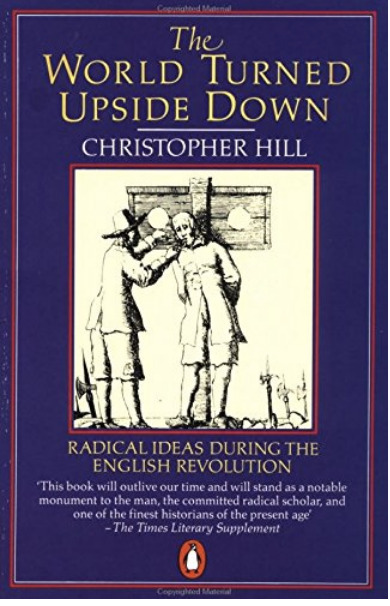
Christopher Hill's 'The World Turned Upside Down: Radical Ideas During the English Revolution', first published 1972 (Viking Press).
In 'The World Turned Upside Down' Christopher Hill studies the beliefs of such radical groups as the Diggers, the Ranters, the Levellers and others, and the social and emotional impulses that gave rise to them. The relations between rich and poor classes, the part played by wandering 'masterless' men, the outbursts of sexual freedom, the great imaginative creations of Milton and Bunyan - these and many other elements build up into a marvellously detailed and coherent portrait of this strange, sudden effusion of revolutionary beliefs. (Penguin, 2020)
On Hill:
Christopher Hill was born John Edward Christopher Hill in York, England on February 6, 1912. He attended Balliol College, Oxford University and later became the master of the college from 1965 until his retirement in 1978. In 1940, he was commissioned as a lieutenant in the Oxford and Bucks Light Infantry, before becoming a major in the intelligence corps in the Foreign Office from 1943 until the end of World War II. He was a Marxist historian whose work examined the role of economic factors in the events of 17th-century England. His works included The English Revolution 1640, Intellectual Origins of the English Revolution, God's Englishman, Reformation to Industrial Revolution, AntiChrist in 17th-Century England, Milton and the English Revolution, The World of the Muggletonians, The Experience of Defeat, and Liberty Against the Law. He died on February 23, 2003 at the age of 91. (Google Books, nd)
[I'm not able to link the pdf of the text here, but it is available in my sweeties document or through careful googling]
I found out about this through Georgie Carr's brilliant writing on 'Triangle of Sadness'.
"On one level, Östlund seems to posit a direct relationship between an excess of vomit and an intensity of critique. In contrast to the radical tradition of “the world turned upside down,” which aims to write a new history from below, Östlund instead renders society merrily askew." (Carr, 2022)
I abandoned this film in favour of spending time tickling my lover's arsehole in their sleep and couldn't dream of articulating my thoughts on the film as well as Carr does.
I could say: Östlund has created a work that nudges at style, substance, and box-office sales, but manages to rock the boat only in his definition of the word 'satire'.
But why bother? Here is Carr's article:
#christopher hill#georgie carr#another gaze#contemporary cinema#british cinema#swedish cinema#Ruben Östlund#cinema essay#british history#british politics#the world turned upside down#the diggers#the ranters#the levellers#radical politics#to read#politics resource#history resource
2 notes
·
View notes
Note
How do you not know who mao is lmao bitches are dumb and proud now
i know who the dictator mao is but idk his last name bc ppl usually just refer to him as mao or talk about being a maoist or whatever sry im having a woman moment
#i also know very little about him tbh#its not like they teach us a lot about chinese history and politics in swedish schools lol
2 notes
·
View notes
Text
i've listened to quite an interesting variety of songs in the past few days so now the audiation part of my brain is alternating between "i am unworthy of your love, chaarliee" and "unopposed under crimson skies, immortalized over time, their legend will rise," etc, and it is /disconcerting/
#when i encounter interesting music the 'mentally singing' area of my brain starts rapidly flipping between the most memorable/catchy bits#and then gradually less catchy ones until i can sing along with the song/album/show#this is usually fine bc I'll watch a show or listen to an album and nothing else for several weeks until i've absorbed it#but I watched Assassins (a bizarre Sondheim musical) two days ago#and listened to most of Sabaton (a swedish military history metal band)'s popular songs today#and even though the former is too uncatchy (not a sondheim fan lol) and the latter is too politically questionable for me to /absorb/#(full on absorb mode is like 'i can sing the entirety of Homestuck the Musical from memory')#there are still enough catchy bits that it gets weird#bc my brain is trying to memorize a bunch of very different songs all at once
1 note
·
View note
Text
some smaller bookstores, presses, and museum shops to browse and know about! Most support smaller presses, diverse authors and authors in translation, or fund museums and arts research)
(disclaimer: the only three I’ve personally used are the Yiddish book center, native books, and izzun books! Reccomend all three. Also roughly *U.S. centric & anglophone if people have others from around the world please feel free to add on
birchbark books - Louise Erdrich’s book shop, many indigenous and First Nations books of a wide variety of genres including children’s books, literature, nonfiction, sustainability and foodways, language revitalization, Great Lakes area focus (https://birchbarkbooks.com/)
American Swedish institute museum store - range of Scandinavian and Scandinavian-American/midwestern literature, including modern literature in translation, historical documents, knitters guides, cookbooks, children’s books
https://shop.asimn.org/collections/books-1
Native books - Hawai’i based bookstore with a focus on native Hawaiian literature, scholarly works about Hawai’i, the pacific, and decolonial theory, ‘ōlelo Hawai’i, and children’s books Collections | Native Books (nativebookshawaii.org)
the Yiddish book center - sales arm of the national Yiddish book center, books on Yiddish learning, books translated from Yiddish, as well as broader selection of books on Jewish history, literature, culture, and coooking https://shop.yiddishbookcenter.org/
ayin press - independent press with a small but growing selection of modern judaica https://shop.ayinpress.org/collections/all?_gl=1kkj2oo_gaMTk4NDI3Mzc1Mi4xNzE1Mzk5ODk3_ga_VSERRBBT6X*MTcxNTM5OTg5Ny4xLjEuMTcxNTM5OTk0NC4wLjAuMA..
Izzun books - printers of modern progressive AND masorti/trad-egal leaning siddurim including a gorgeous egalitarian Sephardic siddur with full Hebrew, English translation, and transliteration
tenement center museum -https://shop.tenement.org/product-category/books/page/11/ range of books on a dizzying range of subjects mostly united by New York City, including the history literature cookbooks and cultures of Black, Jewish, Italian, Puerto Rican, First Nations, and Irish communities
restless books - nonprofit, independent small press focused on books on translation, inter and multicultural exchange, and books by immigrant writers from around the world. Particularly excellent range of translated Latin American literature https://restlessbooks.org/
olniansky press - modern Yiddish language press based in Sweden, translators and publishers esp of modern Yiddish children’s literature https://www.etsy.com/shop/OlnianskyBooks
https://yiddishchildrensbooks.com/ - kinder lokshen, Yiddish children’s books (not so many at the moment but a very cute one about a puffin from faroese!)
inhabit books - Inuit-owned publishing company in Nunavut with an “aim to preserve and promote the stories, knowledge, and talent of Inuit and Northern Canada.” Particularly gorgeous range of children’s books, many available in Inuktitut, English, French, or bilingual editions
https://inhabitbooks.com/collections/inhabit-media-books-1
rust belt books - for your Midwest and rust belt bookish needs! Leaning towards academic and progressive political tomes but there are some cookbooks devoted to the art of the Midwest cookie table as well https://beltpublishing.com/
#Books#shopping reccomendations#Targeted/smaller and more specific presses can be jsut as dangerous even more so as you find so many things you didn’t know you needed!#(But you do! You so very much d)#Esp if you’re feeling like something beyond target book club picks lol
172 notes
·
View notes
Text
Moth to a flame.

Summary:
Aemond has always had a thing for his older brother’s best friend.
Warning(s): Language, Kissing, Loss of Virginity, Smut – Fingering, Oral sex (M & F Receiving), P in V, Safe Sex, Multiple Orgasms.
MODERN AEMOND x Y.N
INSPIRED BY THE SONG - SWEDISH HOUSE MAFIA FT THE WEEKEND - MOTH TO A FLAME.
Word Count: 2915
Taglist - @zeciex
Disclaimer: I do not own any of the House of The Dragon or Fire & Blood characters nor do I claim to own them. I do not own any of the images used.
Comments, likes, and reblogs are very much appreciated.
Aemond groaned in frustration as his brothers groans of pleasure grew louder, the rhythmic sound of the headboard banging against the wall.
“Selfish prick-“ muttered Aemond the jealousy bubbling in the pit of his stomach.
Aemond had always had a thing for his brother’s best friend, ever since they’d been introduced, she lived in the apartment across from them and Aegon being the more confident of the brothers had spoken to her first, with the pair of them becoming firm friends.
She was currently studying a degree in English and History at the local university in the hopes of becoming a teacher someday, all whilst working at a grocery store.
Aside from the fact that she was intelligent, kind, generous, and funny, Aemond also liked the fact that she was immune to Aegon’s garish attempts at seduction, politely declining his repeated advances until he finally gave up his pursuit.
But they struck up a firm friendship nonetheless and from then on Y.N had become a regular fixture in both of their lives. That was two years ago and every day since then had felt like torture.
In a way he was slightly envious of Aegon when it came to matters of the opposite sex, his older brother never had any issues charming the pants off literally every woman that took his fancy whereas he was still a virgin at the age of twenty one.
Gods it was so embarrassing, of course he wanted to have sex, but he just couldn’t get past his own shyness and insecurity over the scar on his face and his missing eye, that he never reciprocated any woman’s advances, not that there were many anyway.
He was convinced they were doing it out of pity or simply an attempt to mock him, and he didn’t want to feel vulnerable in that way, so he simply stayed away and guarded his heart and his feelings.
He liked to imagine all the ways he would please Y.N, with his fingers, his tongue, and his cock, he wanted her in every way possible, but he was too damn shy to even try so he resigned himself to fucking his fist whenever the urge got too much.
And now he’d missed his chance, Y.N was next door fucking his brother and it made him angry, gods Aegon was such a prick, he knew of his feelings for Y.N and still he’d pursued her and fucked her. How many times had they done it? How long had it been going on for? And by the gods Aemond would kill Aegon if he discarded Y.N like she was nothing.
Aegon wasn’t the best when it came to dealing with the aftermath of his pursuits, he enjoyed the chase, did what he had to in order to get what he wanted and then threw them away as if they were nothing.
Aemond had lost count of the amount of women who would come banging on their door, looking for Aegon after he had ghosted them, it was actually exhausting.
“For fuck sake” muttered Aemond as he rubbed his eye and stared at the alarm clock on his nightstand.
After figuring out that trying to sleep was a pointless endeavour Aemond got out of bed, not like he could sleep with that racket going on next door anyway.
Slipping on a pair of sweatpants over his boxers, Aemond left his room and walked into the kitchen, perhaps a drink and a smoke would dampen his ire, or maybe he’d finally check out that series on Netflix that Aegon kept insisting he watch.
After running a hand through his dark hair, Aemond opened the fridge and grabbed a bottle of water, twisting the cap and taking a large gulp as he turned around.
“JESUS FUCKING CHRIST” shouted Aemond as he spotted Y.N sitting at the table, her face illuminated only by her laptop screen.
“Sorry -I didn’t mean to scare you,” said Y.N softly.
“W-What are you doing here?” gasped Aemond.
“My WIFI is out so Aeg said I could use yours-I have an assignment due at the end of the week,” said Y.N motioning to her laptop and the mountain of books beside it.
“No-I meant what are you doing out here, I thought you was in Aegon’s room”.
“Why would I be in Aeg’s room?” asked Y.N
“Well, I-I heard him with someone and-“
“-So you just naturally assumed that it was me?” muttered Y.N frowning.
“N-No-it’s just he said earlier that he’d asked you to come over” replied Aemond.
“He did ask me, but I had a shift at the shop, and then he said something about Cassandra”.
Aemond could feel his cock stirring in his trousers at the sight of Y.N sitting at the table in her short p.js, with one leg raised.
The material of her shorts rid higher on her thigh, exposing her creamy flesh.
“Oh, so that’s who’s in his room” muttered Aemond the feeling of relief washing over him.
“I guess so, he’s been trying to get in her knickers for a while, so his questionable attempts at flirting have finally paid off,” said Y.N shrugging.
“I guess” mumbled Aemond.
“You honestly thought that I was with him?” asked Y.N her eyes lingering on Aemond’s bare chest, her teeth catching on her lower lip at the sparse chest hair and the silver cross chain he wore.
“Yeah-sorry about that” whispered Aemond.
“I had hoped that you would think better of me” replied Y.N.
“I don’t think about you at all” lied Aemond his tone a little sharper than he intended.
“Oh really?” asked Y.N as she slowly rose from the chair.
“N-No” gasped Aemond, his face suddenly feeling very hot.
“I see the way you look at me-“ muttered Y.N
“I-I don’t-“ stuttered Aemond, his eye focused on the thin strap of Y.N’s top that had slipped down her shoulder.
“I like the way you look at me-“ whispered Y.N
“Y.N-“ exclaimed Aemond as she reached forward and gently cupped the scared side of his face.
“So beautiful” whispered Y.N.
“N-No I’m not” muttered Aemond lowering his head.
“Yes, you are-“ said Y.N as she leaned forward and pressed a gentle kiss to his scared cheek.
Aemond’s heart was pounding in his chest, he could smell the sweet scent of Y.N’s perfume and feel the heat from the proximity of her body.
Y.N seemed to be waiting for him to make the next move, she smiled softly as she reached down to take his hand, squeezing it gently.
Aemond stood mute, his mind screaming at him to lean forward and kiss her, the girl of his dreams was standing in front of him in her short p.js looking at him expectantly.
He wasn’t aware of how much time had passed but the heat of Y.N’s body suddenly moved away from him, taking his silence as a rejection of her advance.
“I’m sorry-“ muttered Y.N her cheeks tinged pink.
Aemond could only stand there as he watched Y.N rapidly collecting her things, she was clearly embarrassed.
“Tell Aeg thanks for letting me use the WIFI-“ said Y.N as she rushed towards the door, her breath hitching in her throat as she struggled with the door handle before pulling it open and running across the hall to her own flat.

Aemond blinked and slowly he came back to himself.
Y.N had propositioned him, and he’d just stood there like a complete twat and now she’d fled the apartment and would likely never return for fear of running into him.
No, that just wouldn’t do. Y.N was different from other girls; she didn’t look repulsed at the sight of his scar or pretend it didn’t exist.
She had called him beautiful, and he’d just stood there, and not said a word.
He could have been kissing her right now, and yet he was still standing there.
With a huff of annoyance, Aemond stalked forward and wrenched open the door, he didn’t care that he was only wearing a pair of sweatpants, he just wanted to make things right with Y.N.
He took a deep breath and knocked on the door.
She didn’t answer, so he knocked again and again.
“Please Y.N-Open the door” begged Aemond as he pressed his forehead against the wood.
He internally cursed his own stupidity and was about to give up when he suddenly lurched forward as the door flew open.
“Aemond-“ muttered Y.N.
“-Y.N” replied Aemond as he gently cupped her face with both hands and pressed his lips against hers.
He pulled away for a moment so he could quickly kick the door closed and then his mouth descended upon Y.N’s again.
Aemond couldn’t help the small groan that escaped his lips as Y.N’s pierced tongue slid against his.
Y.N slowly slid her hands up the back of Aemond’s neck and into his hair and pulled it slightly, delighting in the little moan he made.
Aemond slowly moved his hands down Y.N’s body before roughly grasping her ass and hauling her up against the door.
Not having any clue at all where this bravado came from, but he was more than content to roll with it.
Y.N whimpered, gripping at Aemond’s shoulders as he slots himself between her legs, his tongue still invading her mouth.
Aemond presses himself against the apex of Y.N’s thighs, and he growls like an animal when she reaches down and palms his hard cock over his sweatpants.
“Fuck-“ groans Aemond as he begins grinding his clothed cock against her.
“Someone’s eager” whispered Y.N as she flicked her tongue against the corner of Aemond’s mouth.
“Oh-baby girl you have no idea” rasped Aemond.
“Bedroom” muttered Y.N.
Aemond nodded eagerly as he lowered Y.N to the floor and took her hand, his heart pounding in his chest.
Of course, he’d been in Y.N’s flat plenty of times for movie nights and game nights, but this night was totally different. It was the night that he would lose his virginity.
As they entered her bedroom, Y.N gently cupped his face and pressed her forehead against his.
“Are you sure?”
“More than anything-I want you” replied Aemond.
“If things get too much for you-We can stop” whispered Y.N.
“I know”
Y.N smiled as she stepped back from Aemond and reached down to pull off her strappy top.
Aemond stared open mouthed as he gazed at Y.N’s bare breasts, he reached out with a shaking hand and gently ran his fingers over her nipple that had hardened in the cool air of the room.
“You are so beautiful” exclaimed Aemond, of course he’d seen breasts before, but none as exquisite as Y.N’s.
“As are you my dragon”.
Aemond blushed as he watched Y.N hook her fingers into the waistband of her p.j shorts and pull them down.
His mouth watered as he gazed at her naked body, she was indescribably beautiful. Her pale flesh, her rosy nipples, the rose tattoo on her hip and the neatly trimmed thatch of hair at the apex of her thighs.
“Y-You are perfect” muttered Aemond as he leaned forward and pressed a series of gentle kisses to Y.N’s neck.
“Aemond” whimpered Y.N.
Suddenly coming to the realisation that he needed to be naked too, Aemond reached down and began to push down his sweatpants and boxers but Y.N stopped him.
“Allow me” muttered Y.N as she sank to her knees and pulled his sweatpants down.
Y.N’s eyes widened slightly as his hard cock sprang free and slapped up against his abdomen, sure she’d felt it over his sweatpants but to actually see it, was another matter entirely. Aemond had truly been blessed, he was very well endowed.
“C-Can I take you in my mouth?” asked Y.N.
“Yes” whispered Aemond, his chest heaving.
Gods it was like heaven, the moment Y.N’s warm, wet mouth enveloped his cock, Aemond knew he was done for.
The metal of her piecing rubbed against his shaft as she moved her mouth up and down his length.
“F-Fuck” groaned Aemond as his cock throbbed, his seed spilling inside her mouth.
Y.N hummed around his cock before she looked him in the eye and swallowed every last drop.
“Shit-shit, I-I’m sorry” exclaimed Aemond his cheeks tinged pink.
“It’s ok-really” replied Y.N wiping the corners of her mouth.
“I wanted it to last longer” whispered Aemond as he helped Y.N to stand up.
“Don’t worry. There are other things we can do whilst we wait for you to be ready again” replied Y.N as she took Aemond’s hand and led him to bed.
“I-I want to k-kiss you down there” said Aemond shyly.
“Ok” said Y.N softly as she laid back on the bed and opened her legs.
Aemond groaned as he gazed at her glistening folds, gods she was beautiful there too.
“Let me guide you-“ muttered Y.N.
Aemond nodded eagerly as he climbed onto the bed and laid down between her open legs.
“You can use your tongue, your fingers or both at the same time-let me show you”.
Aemond observed intently as he watched Y.N’s fingers encircled what she called her ‘pearl’ soon his insides were squirming, and his fingers were itching for him to take over and bury his face into her cunny and bring her to peak.
“P-please let me, I-I want to” begged Aemond as he pressed forward.
“Oh-“ moaned Y.N as she felt Aemond’s tongue gently run along her slit.
“Hm, are you always this wet” rasped Aemond.
“Only for you” moaned Y.N as Aemond’s mouth slowly descended on her cunny.
Ravenously, he pressed into Y.N’s core with his tongue, in and out.
Y.N clutched the bedspread above her head, her fingers digging into the fabric, gods he was a fast learner.
Aemond withdrew from her soaking wet core and lashed hard at her clitoris with his tongue, pulling on it with his lips. He was hard, fast and brutal, alternating between her assaulted bundle of nerves and drinking deep from her cunt.
Y.N ground down on Aemond, hard; his tongue speared deeper inside her, and she felt the warm curl of her peak approach.
“Are you going to come for me?” asked Aemond, his fingers reaching forward to caress her pearl.
“AEMOND” screamed Y/N arching off the bed as she peaked.
“Hm” muttered Aemond as he pressed a series of kisses to Y/N’s inner thighs.
“P-Please A-Aemond. Need you” begged Y/N.
Aemond rose from the bed, his chin shining with her slick, he smirked as he swiped his fingers over his chin and then put them in his mouth, savouring the delicious taste of Y/N.
“W-Was that alright?” asked Aemond nervously.
“You were amazing”.
Aemond blushed furiously as Y.N directed him to lay on her bed.
“I’m on the pill, but I have condoms” asked Y.N gesturing to the draw of her nightstand.
“No-I want to feel you” replied Aemond.
Y.N smiled as she moved over Aemond’s body, her slick folds rubbing against his cock.
Gods he was so hard, it was bordering on painful.
Y.N reached down and Aemond groaned as he felt her warm hand wrap around his cock and guide it to her wet entrance.
“A-Are you sure?” asked Y.N.
“Yes-Please Y.N I want you” exclaimed Aemond.
Y.N took a deep breath as the tip of his cock pressed inside her.
"Gods. You feel so good" rasped Aemond.
"Fuck, Aemond" moaned Y.N as she slowly sunk down on his cock.
“Please” begged Aemond his fingers digging into her hips.
“I’m going to move now” whispered Y.N as she rolled her hips against his.
“Yes” moaned Aemond as he began to thrust slowly, trying to prolong the feel of Y.N squeezing his cock.
“Aemond-“ whimpered Y.N as he began teasing her pearl with his fingers, his cock throbbing inside her.
Her hands ran along his arms, over his shoulders and down his chest, digging her nails into his pale skin.
“Gods, Y.N" grunted Aemond, speeding up slightly.
If this was heaven, then Y.N was at the centre of it, and he never wanted to leave.
Aemond looked at where they were joined, and he groaned at the sight of his cock shiny with her slick, this was everything he’d hoped it would be and he was glad that he got to share this with her.
“Aemond! I’m going to come. Oh, fuck!” screamed Y.N.
Y.N looked amazing as she came. Her head thrown back in pleasure, her eyes alive with lust, and her skin shining with sweat.
Y.N clamped down around Aemond’s cock so hard he could hardly move. That, combined with how glorious Y.N looked, pushed Aemond over the edge, the heat shooting across his abdomen.
“God. Y.N” groaned Aemond as he exploded. His cock throbbing and twitching as he spilled his seed inside her wet heat.
Y.N collapsed on top of Aemond for a moment, her chest heaving.
Aemond gently moved his hands up and down her back, savouring the feeling of his softened cock still nestled snugly inside her.
After a few minutes, Y.N slowly moved off Aemond and flopped onto the mattress next to him.
Basking in the after glow of his orgasm, Aemond moved onto his side and pressed his face into Y.N’s neck.
“Does this mean that your my girlfriend now?”
#house of the dragon#aemond targaryen#hotd aemond#aemond fanfiction#hotd fanfic#aemond fic#hotd fic#aemond one eye#aemond x reader#aemond smut#hotd smut#hotd
267 notes
·
View notes
Note
For outfit ideas, I think it would be fun to explore historical outfits!! For example, I think Fin would look very cute (and prob very uncomfortable) in the knightly order outfit of Gustaf Mauritz Armfelt, an important (and very interesting!!) Finnish diplomat from the 18th century
This got lost in my drafts, sorry about that, anon!! This is a nice request, historical outfits are fun to draw! (I agree, this outfit must feel a bit uncomfortable)

And you're right; Armfelt was a fascinating character. I definitely recommend that people read more about him if Swedish/Finnish history interests you! But very simply put, he was a powerful official in Gustav III's court (and one of the king's rumored lovers) who was later declared a traitor in Sweden for treason. After the Swedish coup of 1809 and the deposition of the king, Armfelt moved to the newly seized Grand Duchy of Finland and continued his political career in the Russian Empire, helping to lift Finland's status and rights significantly.
But in general, the era of the Swedish kingdom's split into Sweden and Finland is so interesting - with many characters like Armfelt. In Sweden, the nobles and officials who stayed in Finland and pledged the oath of allegiance to the old enemy, Russia, were seen as traitors. Though not everyone swore the alliance, some individual soldiers and officials, still loyal to the crown, ended up fleeing and residing in Sweden.
But in parts of the high Finnish society, the dissatisfaction with the crown had existed for a while already (e.g., Anjala Conspiracy, Proclamation of Empress Elizabeth of 1742, Sprengtporten's constitution of 1786). Note that these attempts weren't motivated by nationalistic motifs but out of frustration with the domestic politics in the kingdom. The absolute monarchy was abolished in Sweden in 1719, basically due to the catastrophe that was the Great Northern War (especially in Finland). However, King Gustav III restored the old monarchy in a coup d'état of 1772 and launched more wars with Russia over the rule of the Baltic Sea. So it's probably no coincidence that the dissatisfaction grew especially in the eastern part of the kingdom throughout the 18th century. The final blow being the incompetence during the Finnish War of 1808.
And the position that Alexander I of Russia offered to "Finns" in 1809 was very favorable; by pledging loyalty in the Diet of Porvoo, the Grand Duchy got to keep its constitution, laws, language, religion, and even the taxes that it collected for itself. The first few decades of the Grand Duchy were critical in creating the path to independent Finland. And, of course, significant political changes happened in Sweden as well. Losing a third of the land area and a fourth of the population led to Sweden demanding their neighbor Norway as compensation in 1814
#sorry history nerd moment#but imo kalmar union and napoleonic wars are probably the most interesting eras to explore from the nordic personifications pov#hws finland#my art#historical hetalia
124 notes
·
View notes
Text





i have to do more bc she isnt rly brought to life yet.. she will change a LOT... but this is dylan :-] (hammarlund? underhill?) i couldn't not do a hilda oc and i couldnt not make it a nervous werewolf. she stresses herself out but is surprisingly organised about cooking, one of the famously stressful activities. she spends a full day planning out a meal, cooking for herself and kaisa (thank god. that nerd cannot cook) and then asks for detailed reviews.
she is very stressed out about being a werewolf though. she has just finished being a teenager and this is kind of that all over again. she does not want ANYONE to find out and confides reluctantly only in kaisa. what she fears is people fearing her, and she feels like the moment her life has been pieced back together again, she's losing grip, again. it's almost a black hound situation when the people of trolberg hear about a werewolf sneaking around. some episode centred around the mystery ensues.
she likes food + music! although she's more of an amateur at music, she owns + plays a guitar, a mandolin, a banjo, and a harmonica. very folksy. she has a swedish-welsh accent. try and imagine it please.
the default sister dynamic is kaisa getting home from work late (she probably lives in a flat in/around the library), and dylan being in the midst of homemade ravioli or something with a sauce that took 6 hours. kaisa asks about her day to be polite. dylan tells her about the sauce that took 6 hours, a long hike, 3 different invasive plant species, a lot of butter, and the use of powertools. kaisa has been re-shelving niche history of magic books but got so caught up re-reading them that it also took up 6 hours. when they have eaten dylan asks for her opinion and scribes the whole thing down in her notebook as kaisa voices her 5 star yelp review. they do not ask anything else about each others days and interact mainly through dylan slow-motion fake-punching kaisa while she is trying to just hang out in the living room or do her work and is ignored. only when she is in a very good mood will kaisa fake-punch back. dylan has a lethal case of younger-sister-that-is-taller syndrome.
sorry for my handwriting but the vague outline of her backstory WHICH MAY PROBABLY CHANGE is:
from the time she was 8 and kaisa was 21, they lived alone together. kaisa became a full-fledged witch between then and age 25, when suspicion against witches was on the rise for a short while - dylan never became a witch, but the only trusted adults in her life (basically kaisa and tildy) were, and they decided it would be best for her to grow up somewhere less troublesome. they were both pretty messed up about her having to move away, dylan holding some kind of spite toward her sister for a while, and kaisa feeling incapable, guilty and ill-equipped to take care of her.
she went to school in wales at 12, living with as-yet-unspecified family members/friends, and while kaisa almost immediately regretted sending her away, dylan adjusted quickly and spent the rest of her school career there. after a few years she forgave kaisa, because she ultimately enjoys her life, but she is stilll missed at home. at 17 going on 18 she became a werewolf (whether she was bitten or it was always in her somewhere?) and four months later she finished sixth form and called kaisa out of the blue asking if she could come and move in. since they didn't live in trolberg before, she's new to the city.
i will write more cohesively about her relationships to other characters/flesh her out more later, ESPECIALLY the werewolf stuff, but now i have to go to bed. thank you for reading :-] feel free to ask/suggest anything about her!! i love discussing hilda ocs
by the way this is i think my first ever actual OC? i've made up others before but they've just been single designs i've never really thought much about their actual selves because i suck at writing. dylan is the first one thats really stuck. part of her is based off myself and people i know, most of her is not. the main similarity between us is double-denim.
this is fun though. critique is welcome
(obviously her werewolf self is a swedish elkhound. i know the design kind of just looks like a furry im working on it)

#hilda the series#hilda netflix#kaisa#dylan#hilda oc#original character#im going to bed sorry this is not proofread
133 notes
·
View notes
Text
United By Music Hatred Of The Jury
Eurovision has been dogged by allegations of cheating, corruption, bad judging calls, and hatred of the jury for many years. This year brought that to a head with Sweden’s win over the public favourite Finland, in an allocation of points that shocked Europe.
Sweden received only 243 points from the public vote, without a single “douze points” from any country. Finland received 376 votes from the public, the second highest amount ever, including the coveted 12 points from eighteen different nation-states. How, then, did Sweden manage to win? Finland was only awarded 150 points by the professional jury, while Sweden was given 340, sailing their singer Loreen, a previous Eurovision winner, to victory.
Understandably, people are upset.
One reason that Finns have said it hurt to lose to Sweden is due to their history. Finland was colonised by Sweden for over 600 years, after Sweden annexed them (a long process lasting between the 1150s and 1350s at least). Sweden is still seen as superior in a number of ways. The Finnish language is often considered weird and ugly. Käärijä, the singer representing Finland, went to Eurovision to prove that a song sung in Finnish could win.
The professional jury clearly shows bias against songs sung in native and minority languages and not English. Time and time again, they vote for the most generic pop songs instead of performances laced with languages and culture from the performing countries. Last year in 2022, France sent a song in Breton, a language with a long history of oppression in France, with Celtic iconography. They received only 9 points from the jury. Meanwhile, audiences enjoyed the performance, and were happy that France finally sent something other than a modern chanson song, French audiences included. Keiino included aspects of Sami culture and language in their song in 2019, and lost out to the Netherlands, falling several places due to the jury vote. The Eurovision Song Contest exists to showcase and celebrate the full cultural richness of the competing countries, and it is wholly wrong for the jury to penalise that.
This argument is unhelped by those that often complain about the amount of Anglophone pop songs, yet then vote for the same due to loyalty, or the attractiveness of the singer, or politics. There is nothing wrong with voting for an English language pop song if you think it is the best song that year, but one way to help these non-English language songs is to allocate them a smaller amount of votes and save the rest for your favourite. This way these countries know that other people did enjoy their performances, and that they would like to see more of the same.
During its occupation by Sweden, Swedish became the dominant language in Finland, spoken by the upper class, administration, and education. It was only under Russian rule that the Finnish language started to gain traction and recognition, finally achieving equal status as Swedish legally in 1892. This is part of why it was so important to Finns to have a winning song sung in Finnish, their only previous win being in English. To show that their language is not rough and ugly sounding, and to demonstrate what it means to sing in your native language. The crowd sang along to Käärijä’s performance in Finnish; people who are not Finnish and have never spoken a word of Finnish. I cannot imagine that feeling. Käärijä also performed topless, with a perfectly normal body, unlike the heavily chiselled bodies favoured by Hollywood, which are, only produced by extreme diets, workout regimes, and dangerous levels of dehydration. It is no surprise he became a national treasure. Finland redecorated statues and had green shrines in their libraries and supermarkets. The country was so excited. Then they lost to Sweden over the jury vote.
Norway got the third highest votes this year from the public. They also won the televoting in 2019 too, but lost because of the professional jury votes that propelled Netherlands to the win. It was said that Norway may have had some voice trouble during the finals week, including her jury performance. The BBC praised her jury performance, but Swedish newspapers allegedly said it was very rough, and that she missed nearly every note.
The professional jury doesn’t judge the same Grand Final performance that everyone else sees. The jury judges the final jury performance, a separate show where the public is not allowed and only press accredited people can attend. Performers will obviously give it their best, but that does not guarantee it will be their best performance. It is also reasonable to assume that some singers might have a lower energy performance during the jury performance due to exhaustion, or in order to save up for the grand final, among other possibilities.
It is clear that everyone needs to be voting on the same show – anything else is just blatantly unfair. Votes cannot be accurately distributed if people are voting on two different shows.
If the juries are unbiased, we have a huge problem. Even if Finland got 12 points from everyone voting in the grand final, they would have only scraped a win with 11 points. They scored the second highest votes in Eurovision history, second only to Ukraine last year, a win that itself was mired in allegations of cheating and corruption. And yet Finland still lost.
The weighting of the votes is undoubtedly tilted towards the jury. As mentioned earlier, Finland received the second highest amount of televotes in Eurovision history, and won the public vote, yet lost to Sweden based on the professional jury. This is a kick in the face to members of the public that watched and voted. It sends a clear message that the public and their opinion clearly does not matter at all and they might as well have not voted. The public pay for Eurovision, the public stream and download and buy the songs, and as such, the publics vote should count, otherwise why bother? Why have a competition?
As it stands right now, the Eurovision Song Contest is essentially voted on like a US Presidential Election. The professional jury vote is essentially the Electoral College, capable of snatching the victory from the clear public winner that secured the majority of public votes. If we are going to complain about this system being used for American elections, then there is no reason that it should be acceptable here.
One way to fix this is to change the weighting of the jury versus public votes. The professional jury was established to prevent nations from simply voting for their neighbours or allies, yet it is remarkable how often the professional juries’ votes reflect these politics anyway. A 30/70 split to the public votes will allow the jury to make clear who they think should win while also not holding enough sway to alter the public results.
An overhaul also needs to be made to the professional jury itself. It is no secret that corruption is present within Eurovision. Keeping the names of the jury secret to prevent this from happening is only going to make it impossible to know when it has happened. Instead, the jury list should be transparent, and the juries themselves should be diverse, with a number of musical styles represented. Eurovision has a wide range of musical styles perform, and having a jury compiled of industry professionals from only one or two genres will only harm these entries, especially those that draw on traditional music styles. Many fan favourites were cheated by the voting system because their songs and performances weren’t “normal” or “palatable” enough for the jury. As mentioned earlier, these trend towards songs that have considerable influence from the culture of the country, including native and minority languages. It was also caused by the “war” between the juries, as evidenced by the graphic put out by Eurovision showing the difference between the jury favourites and the public favourites. Sweden and Finland sat in the middle of each half, essentially causing a fight over who would win by each half voting only for that one country.
Worldwide voting should also be removed. There should be a return to form when it comes to who can vote, as it was last year. Those that did not pay for Eurovision should not be able to vote, and worldwide politics could tip a win or loss by a considerable amount. The US has a population of almost 332 million people. India has a population of 1.408 billion. Imagine if any country with a population like this had even a fraction of its people cast a vote based on socio-political reasons.
Even within the voting process itself, there are problems. Votes should cost the equivalent amount everywhere. It ranges from 15p/17ct up to over a euro to vote, depending on where you are. This is going to have an impact on who can vote, and therefore who will win. Even on the app, it costs money to vote. This will not be a fair competition until everyone can vote equally and the organisers need to get on top of this rapidly.
Equality is the basis of every democratic vote, but Eurovision does not treat all of its competitors equally. The Eurovision Song Contest explicitly acknowledged the war in Ukraine and the need for another nation to host because of it. They sanctioned Russia by banning them from entering, this year being the second year in a row after their initial ban last year. This is considered the right thing to do, but it has raised several questions. The Eurovision Song Contest declined to let Ukrainian President Volodymyr Zelenskyy address the audience at the grand final, saying that it would politicise the event, ignoring the fact that they had already politicised it by acknowledging the very real events happening in the world that caused something as drastic as a change of host nation. They also politicised it by denying Russia entry. The politics are even implied in the theme. While seen as the correct thing to do, it means they have, to an extent, been hypocritical. They have then taken it one step further though, with the inclusion of Israel.
Israel’s participation has long been debated due to geographical location and politics. However, to ban Russia for the invasion and war against Ukraine while allowing Israel to compete is hypocrisy at its finest. Israel has carried out the same actions against Palestine as Russia has against Ukraine, yet they have not been banned. Instead, they have hosted in recent years, often receive a decent amount of points, and this year had a previous winner featured during the interval act. Many people with the job of awarding points made statements in support of “peace and unity!” only to immediately award points to Israel.
This disparity of treatment is most obvious at two previous competitions. Israel hosted in 2019 when the Icelandic group Hatari famously waved Palestinian flags during the grand final, causing them to be deported and banned from the country. They were later fined for breaking the no politics rule.
In 2021, the Israeli entry was a song called ‘Set Me Free’, a song title that was mocked and by many for its irony. The day before the grand final, Israel launched a missile strike against Palestine (reminiscent of the harrowing news that the hometown of the Ukrainian entry was bombed moments before they took to the stage this year simply from the other perspective) as part of a series of escalations that included threatening to evict Palestinian families from East Jerusalem and nightly clashes between Palestinians and the police during the Muslim holy month of Ramadan. Many people felt that it was wrong for the performance to go ahead. For a considerable time, YouTube searches for Israel’s grand final performance only returned results for the semi-final.
Despite all this, Israel faced no sanctions at Eurovision. Contrasted with Russia, who has faced sanctions for their actions in Ukraine, fans are understandably angry and upset with Eurovision’s lack of consistent positioning on this issue, calling for the end of the hypocrisy. The double standard shown here, in the disparity of Eurovision’s treatment of Russia and Israel, is a symptom of racialised Eurocentrism – something which remains a massive problem in Europe and a subject which deserves its own post.
Speaking of the war, the UK did not utilise enough Ukrainian talent, or songs. The UK hosted on behalf of Ukraine, yet little of Ukraine was represented. Previous performers Verka, Go_A, and Jamala (who herself faced controversy for her entry at the time, it being an allegory to Russia’s invasion of Ukraine in the same year as the title under the excuse of “allying with Nazis”) returned to sing their Eurovision entries, and last year’s winners Kalush Orchestra returned with an extended opening sequence. Beyond this, and one Ukrainian presenter, Ukrainian representation was far below what it should have been. Other Ukrainian groups or previous entries should have been invited to perform, and the three previous groups that performed should have had the option to sing additional songs if they wanted to. This was a serious let-down by the UK, especially given the interval performance. Famous songs of Ukraine could have been sung instead, or even some of those Liverpudlian songs translated into Ukrainian and sung by Ukrainian performers.
Moving on from those who didn’t perform to those who did: Loreen, too, is facing accusations of rudeness and arrogance. She has already won Eurovision once before and has returned to try and win again. The popular opinion is that those who have won Eurovision before should be allowed to return and perform as part of interval acts, but should not be allowed to enter again. It is unfair to the other contestants; they have already had their moment, and should move on to allow the new competitors a fair chance under the spotlight.
Viewers noticed that it was strange that the hosts kept mentioning Abba, and that a member of Abba even made a recorded appearance. Eurovision has nothing to do with Abba’s 50th anniversary next year. Abba won Eurovision for Sweden in 1974 when the UK hosted on behalf of Luxembourg. Now, 50 years later, Sweden wins Eurovision again, in the UK hosted on behalf of Ukraine, just in time for Abba’s big anniversary. No-one can deny that this coincidence seems suspicious, especially considering the jury versus public votes Sweden received and the landslide amount of votes won by Finland.
And that brings us to the plagiarism. Many fans say Loreen’s song this year, “Tattoo” is very similar to her previous winner ‘Euphoria’. An even more common accusation is that her song is very similar, or even identical to ‘Flying Free’ by Pont Aeri. Indeed, the openings are almost a complete match. It seems hard to believe that she could compose an identical opening without having heard the original at all. Sections of the instrumentals are also similar to Loreen’s entry.
Having not heard about this controversy before the grand final, the comparison this blog draws is with Abba’s ‘Winner Takes It All’. Perhaps this is why Sweden scored so many points from the jury this year? After all, Abba constructs very enjoyable, musically excellent songs. This was only noticed when my own father heard Sweden’s entry and began singing along with Abba’s lyrics, only realising that something was different when his lyrics didn’t match Loreen’s. He has been a fan of Abba since they won Eurovision and owns several records and CDs. And even he thought it was a dance remix of Abba.
During the judging section of the competition where the points are awarded, the crowd kept booing, and chanting Käärijä’s name and “cha cha cha” while the hosts were trying to announce Sweden’s victory. This chanting continued during Loreen’s victory song, as well as many other competitors immediately making their way to Käärijä to chant and support him. It was very clear who people thought the winner should be, and it was not Loreen.
No-one remembers who won the year Verka performed. They remember Verka. That’s what’s going to happen this year. This won’t be remembered as the year Loreen won Eurovision for the second time. This will be remembered as the year the juries finally went too far, and the year Finland was robbed.
Next year we should all just send our previous winners. And maybe question if Israel has a place in this competition anymore.
#eurovision#eurovision 2023#esc 2023#finland#sweden#uk#russia in eurovision#ukraine in eurovision#israel in eurovision#finnish people if we got anything wrong please let us know
203 notes
·
View notes
Text
♀️latscho diwes djuviale♀️
💞 I made this blog to highlight the specific struggles Romani women face based on our sex, our race and our class
💞 I'm anti-gender, anti-sex trade, anti-religion, anti-capitalist
💞 I support women's and LGB rights. My feminism is female only!
💞 I'm a half-sinti, half-white working class homosexual woman living in Western Europe
BEFORE YOU BLOCK ME, READ THIS: x

FAQ, BOOKS AND RESOURCES BELOW
General / Frequently asked questions
-> Difference between Roma and Romanian (x)
-> Difference between Roma and Sinti (x)
-> My profile picture is from De la source à la mer (1984), by Sinti-Manouche filmmaker and writer Pisla Helmstetter
-> My banner is from The Gypsies are Found Near Heaven (1975), by Emil Loteanu
Posts on the racialized misogyny targeting Romani women
-> general masterpost (x)
-> posts on Romani women being sex trafficked into prostitution in Europe (x) (x)
-> posts on the forced sterilization of Romani women in Europe (x) (x) (x) (x)
-> post on healthcare discrimination (x)
-> incest, sexual and domestic violence targeting Eastern European Romani women (x) (x)
-> Roma, religion and misogyny (x)
-> On "Gypsy witches" (x)
Inspiring Romani women you should know about
-> autobiographies by Romani women (x)
-> Sandra Jayat, French-Romani painter and poet (x)
-> Katarina Taikon, Swedish-Romani writer and antiracist activist (x) (x)
-> Elena Gorolova, Czech-Romani women's rights advocate (x)
-> Jelena Savić, Serbian-Romani feminist, poet and essayist (x)
-> Tela-Tchaï, French-Romani actress (x)
-> Amoun Sleem, Palestinian-Domari antiracist activist and feminist (x)
-> Philomena Franz, German-Romani Holocaust survivor and writer (x)
-> Vera Kurtić, Serbian-Romani lesbian feminist (x)
-> Kiba Lumberg, Finnish-Romani and butch lesbian artist (x)
-> Zilli Schmidt, German-Romani Holocaust survivor (x)
-> "15 Bad ass Romani ladies you should know about" (x)
-> Romani herstory, an "ever-growing digital library that celebrates women of Romani descent from the past and present, unsung heroines & trailblazers who refuse(d) to conform to stereotypes"
Romani feminist writings
-> Intersections of Gender, Ethnicity, and Class: History and Future of the Romani Women’s Movement, by Jelena Jovanović, Angéla Kóczé, and Lídia Balogh (x)
-> Gender, Ethnicity and Class: Romani Women's Political Activism and Social Struggles, Angéla Kóczé (x)
-> Lessons from Roma Feminism in Europe: Digital Storytelling Projects with Roma Women Activists from Romania, Spain and Sweden, Jasmine Ljungberg (x)
-> Romani women’s identities real and imagined: Media discourse analysis of “I’m a European Roma Woman” campaign, Jelena Jovanović (x)
-> Džuvljarke: Roma Lesbian Existence, Vera Kurtić (x)
-> Re-envisioning Social Justice from the Ground Up: Including the Experiences of Romani Women, Alexandra Oprea (x)
-> Angéla Kóczé on the hijacking of the Romani feminist and antiracist movement by neoliberal groups (x) (x)
-> Mihaela Drăgan on the racialization of Romani women (x)
-> quotes from Romani feminist books (x)
Learn about the Romani genocide
-> general post (x)
The Genocide and Persecution of Roma and Sinti. Bibliography and Historiographical Review (x)
Roma Resistance During the Holocaust and in its Aftermath, Angéla Kóczé, Anna Lujza Szász (eds.) (x)
O Porrajmos: the Romani Holocaust, Ian Hancock (x)
Porrajmos: The Romani and the Holocaust, Ian Hancock (x)
Responses to the Porrajmos (the Romani Holocaust), Ian Hancock (x)
Barvalipe Roma Online University (playlist of lectures about many different aspects of Romani history, politics and culture) (x)
Romani slavery in Romania
Brief overview (x)
Alternatives to the labrys flag


(first design by @/sapphos-darling)
362 notes
·
View notes
Note
As a Christian born and bred it's always been a constant thought of mine of what if I had been born into a different faith, how that would change the person I am. What if I slid the faith settings from Christian to Muslim?
Brother, if you change the attitude now, not much will change. Now you're not going to trim your dick, I guess. You will grow a beard. And your Muslim brothers will despise you as a convert a little less than an infidel. So, in fact, we have to intervene in your history. Your parents separated shortly after you were conceived. Your mother fell in love with a Syrian refugee for whose sake she converted to Islam and married him before you were born. So even though your gene pool is unchanged, your social and religious background is a completely Muslim one.
Your father was not particularly devout. But your mother and sisters had to learn early on that women are subservient to men. And you, as the prince of the family, were carried around by everyone. A wish? Already fulfilled! Fortunately, your father quickly found a job as an engineer and was able to finance everything you wanted. In return, however, you were trimmed to be macho right from the start. Politeness and respect towards your parents. But you never had to show respect to infidels in particular. This probably also explains your somewhat divided relationship to the observance of rules and laws.
Your home is the shisha bar, the gym and Hassan's barbershop. That's where you meet friends and where you do business. Let's say you make your money importing and exporting. Of different things. Mostly with the help of cousins in Syria, Lebanon and Turkey.

Except for the blond hair and your Swedish passport, you are one of your bros. Hardly a difference. Okay, maybe you're in the mosque a bit more often than them… But that's normal if you grew up with a convert as a mother.
By the way, I found your picture @truevikingblood-blog too.
93 notes
·
View notes
Note
I know it's rare for ANY translation to do so, especially English to/from Japanese since the languages are so dissimilar, but can you think of any time where a translation added to a scene, or made it better in your opinion?
Oh plenty of times! There’s even one in this chapter. I try to call them out when I notice them because I appreciate them myself. I don’t have a specific tag for them, though.
The thing is…
Sorry, Anon. You accidentally triggered one of my rants. If you just wanted an answer it's up there ⬆️
Good translations are not rare. Good translations aren’t even rare in manga anymore. The reason a lot of people think of all translations as bad is because people used to not take translations of manga seriously. They wouldn’t give it any care or attention, they’d just whip off whatever sounded close enough, and if they got whole-ass words wrong here or there then it didn’t really matter. Because it’s just comics, right? Who cares about that kiddie crap.
Translation - good translation - is HARD. It’s not just understanding two languages. Linguistic differences between source and translated language are not the reasons translations turn out bad. It’s cultural differences. You have to understand the literature and art and history of both languages, because that informs the environment that the author wrote in and the environment the readers are reading in. You have to make sure someone can just pick it up and read. Giving people cultural context in asides and footnotes and a glossary is great and all, but the experience of reading should be about the TEXT, not about the language. A good translator has to know about cultural and regional backgrounds and tensions in both languages.
Turning a Kansai accent into a Southern accent is a great example of what NOT to do, because the two regions have vastly different cultures that aren’t comparable. An easy illustration is that the stereotype about Southerners is they’re very polite and gracious and charming and speak slowly, while the stereotype about people from Kansai is they’re blunt and aggressive and outgoing and speak fast. But it was the industry standard for years to just slap a “funny accent” on any character speaking with a dialect.
On top of all of those concerns, comics has the additional limitation of space. The translation must meet all of the previous requirements, and also fit into a speech bubble. There is no getting around that. You have to sacrifice meaning somewhere in situations like that, and in an ongoing series with as many twists and late reveals as One Piece it can be hard to guess which word is the one that is crucial to the plot.
There are times I definitely think the translators did a great job, it's usually most noticeable with wordplay and puns, but I'm not sure "better than the original" is how I'd describe that. I think it’s very risky for a translator to try to make the work “better.” The original Swedish translation of Dracula did that back in the day and what they wound up publishing was basically fanfic. (It’s supposed to be really fucking good, though. It just has no more than a passing resemblance to Dracula.)
What does “better” look like? Is it when everything makes sense and is easy to read? But maybe the author wanted this scene to be challenging so you’d slow down and think about it. Is it when you take that random joke out of the serious scene? But maybe that joke was there to balance out the tension of the scene. Is it when the characters always act the way you expect them to? But characters, like people, have contradictions and inconsistencies, and if you take those out the character will be flat and boring.
That’s why I think a good translation is one where the translator is invisible. If they’ve done their job right, you should never think about them. But then, if they’re that good, it’s easy to forget how hard they work to get the product that good. And that’s when people start to think we don’t need translators, we have language learning models and machine translation… But that’s a different rant for another time.
Side note, Viz still pays actual human translators for their work. So do Yen Press and Seven Seas, last time I checked. I’m not about to tell you to NOT pirate shit, but if you buy one of their books you’re actually paying for a person to translate it.
Anyway, sorry/thank you for giving me an opportunity to rant about this. As you can see, it means a lot to me.
77 notes
·
View notes
Text

Fuck it
Poll between everything I might actually be interested in
Also @ Americans note that literally all of this is free so I'm not really thinking abt career choices moreso just something to occupy my time with
please RB if you see this I genuinely don't know what to do LMAO
87 notes
·
View notes
Text
THIS DAY IN GAY HISTORY
based on: The White Crane Institute's 'Gay Wisdom', Gay Birthdays, Gay For Today, Famous GLBT, glbt-Gay Encylopedia, Today in Gay History, Wikipedia, and more … February 20




1775 – In Frisia, the Netherlands, two teenage servants are banished for three years for "toleration of sodomy."

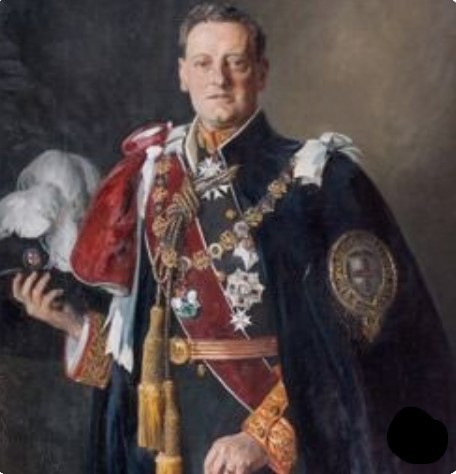
1872 – William Lygon, Seventh Earl Beauchamp, (d.1938), was a British Liberal politician. He was Governor of New South Wales between 1899 and 1901, a member of the Liberal administrations of Sir Henry Campbell-Bannerman and H. H. Asquith between 1905 and 1915 and leader of the Liberal Party in the House of Lords between 1924 and 1931. When political enemies threatened to make public his homosexuality he resigned from office to go into exile. Lord Beauchamp is generally supposed to have been the model for Lord Marchmain in Evelyn Waugh's novel, Brideshead Revisited.
In 1931, Lord Beauchamp was "outed" as homosexual. Although Beauchamp's homosexuality was an open secret in parts of high society, and one that his political opponents had refrained from using against him despite its illegality, Lady Beauchamp was oblivious to it, and professed a confusion as to what homosexuality was when her husband's was revealed. He had numerous affairs at his homes at Madresfield and Walmer Castle, with his partners ranging from servants to socialites, and including local men.
To those in the know Beachamp was notorious for his weakness for footmen, and his children would warn their male friends to lock their doors at night if they stayed at Madresfield, the family estate. His second son, Hugh Lygon, was a close friend, probably a lover, of Evelyn Waugh, and is generally accepted to be one of the main inspirations for Sebastian Flyte in Waugh's novel Brideshead Revisited.
In 1930, while on a trip to Australia, it became common knowledge in London society that one of the men escorting him, Robert Bernays, a member of the Liberal Party, was a lover of his. It was reported to King George and Queen Mary by his Tory brother-in-law, the Duke of Westminster, who hoped to ruin the Liberal Party through Beauchamp, as well as Beauchamp personally due a private dislike he had taken. Homosexuality was a criminal offence at the time, and the King was horrified, rumoured to have said that "I thought men like that shot themselves". The King had a personal interest in the case, as his sons Henry and George (who was bisexual) had visited Madresfield in the past. George was then in a relationship with Beauchamp's daughter Mary, and this was cut off by her father's outing.
After sufficient evidence had been gathered by the Duke, Beauchamp was made an offer to separate from his wife Lettice (without a divorce), retire on a pretence, and then leave the country. Beauchamp refused and, shortly afterwards, the Countess Beauchamp obtained a divorce. There was no public scandal, but Lord Beauchamp resigned all his offices except that of Lord Warden of the Cinque Ports and went into exile on the continent (fearing his arrest if he did not), briefly threatening suicide before going.
Lord Beauchamp died of cancer in New York City, aged 66. He was succeeded in the earldom by his eldest son, William.

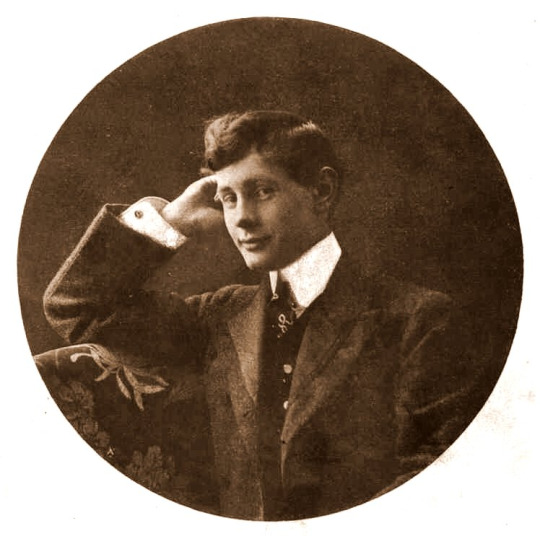
1880 – On this date the Swedish aristocrat Count D'Adelswärd-Fersen was born (d.1923). Baron Fersen, a Swedish Count, living in Paris, was a novelist and poet .
D'Adelswärd-Fersen's grandfather had founded a steel empire, which was profitable enough that it made d'Adelswärd-Fersen exceedingly wealthy when he inherited at age 22. Consequently, he was much sought-after in the higher circles, as families hoped to marry him to one of their daughters.
Apart from joining the military, the young d'Adelswärd-Fersen travelled extensively and published some poems. At around this time, his homosexual leanings became apparent to him, which are also relatively clearly addressed in his poetry. Unfortunately for him, he was not sexually interested in adult men (which at the time in France would not have brought him into legal trouble) but in teenage boys between about 15 and 17 years old. This inclination eventually caused his undoing in French society.
In 1903, accusations surfaced that the Baron had held Black Masses in his house at 18 Avenue de Friedland. Supposedly these orgiastic feasts were attended by local Parisian schoolboys and involved sexual misconduct between the Baron and the boys. He was charged with indecent behavior with minors and served a six-month prison sentence, was fined 50 francs and lost his civil rights for five years.The scandal involving the schoolboys made him a persona non grata in the salons and dashed his marriage plans. He took up residence in Capri, where he lived with his longtime boyfriend, Nino Cesarini, until his death in 1923.
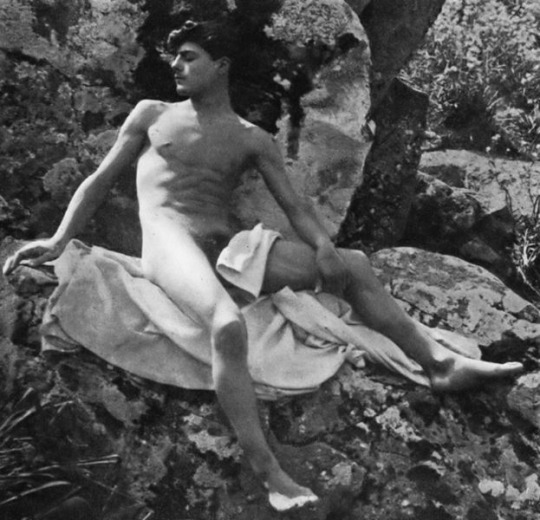
The Count in all his glory
Lord Lyllian, published in 1905, is one of d'Adelswärd-Fersen's novels and perhaps his most important work, satirizing the scandal around himself in Paris, with touches of the Oscar Wilde affair thrown in for good measure.
The hero, Lord Lyllian, departs on a wild odyssey of sexual debauchery, is seduced by a character that seems awfully similar to Oscar Wilde, falls in love with girls and boys, and is finally killed by a boy. The public outcry about the supposed Black Masses is also caricatured. The work is an audacious mix of fact and fiction, including four characters that are alter egos of d'Adelswärd-Fersen himself.
Akademos: Revue Mensuelle d'Art Libre et de Critique (1909) was d'Adelswärd-Fersen's short-lived attempt at publishing a monthly literary journal. It was magazine of a very luxurious kind, each issue printed on several sorts of deluxe paper, with contributions by many famous authors, like Colette, Henry Gauthier-Villars, Laurent Tailhade, Josephin Peladan, Marcel Boulestin, Maxim Gorky, Georges Eekhoud, Achille Essebac, Claude Farrère, Anatole France, Filippo Tommaso Marinetti, Henri Barbusse, Jean Moréas and Arthur Symons.
In each issue, very carefully, as is clear from Fersen's letters to Georges Eekhoud, a homosexual element was introduced: a poem, an article, or a hint in the magazine's serial Les Fréquentations de Maurice by Boulestin. As a magazine with a homosexual agenda, it was the first publication of its kind in the French language. However, only an estimated 10% of Akademos may be counted as homosexual. Thematically, as for the gay part, it trod somewhat similar ground as the German journal Der Eigene, published between 1896 and 1931 by Adolf Brand. This is not a coincidence, as d'Adelswärd-Fersen studied the German publications that tried to push for the social acceptance of homosexuality before launching Akademos. Also, he corresponded with both Brand and Magnus Hirschfeld. Unfortunately, it was published for only one year.
D'Adelswärd-Fersen frequently organised parties in his splendid villa, to which all the intellectuals and 'eccentric' travellers staying on the island of Capri were invited. The Baron lived for twenty years on the island; his death there, possibly through suicide, is thought to have been caused by an overdose of cocaine. His ashes are kept in Capri's non-catholic cemetery.

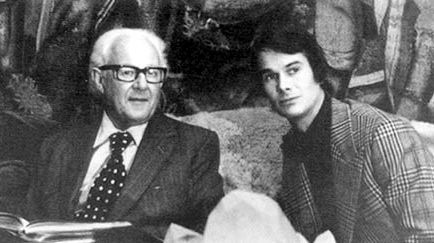
Cooper with his "son" Billy McCarty
1911 – Art historian, critic and collector, principally of Cubism, (Arthur William) Douglas Cooper (d.1984) – who also published as Douglas Lord was born to a wealthy family who had made their fortune in Australia generations before.
In 1933, he became a partner in the Mayor Gallery in London and planned to show works of Picasso, Léger, Miró and Klee in collaboration with Paris-based art dealers like Daniel-Henry Kahnweiler and Pierre Loeb; however, this collaboration ended fast and unfavourably. Cooper was paid out in works of art.
At the outbreak of the Second World War 1939, he acquired 137 cubist works, partly with the help of collector and dealer Dr. Gottlieb Friedrich Reber, some of them masterpieces, using a third of his inheritance.
Cooper chose to join a medical unit in Paris when World War II started. His account of the transfer of wounded soldiers to Bordeaux to be shipped to Plymouth achieved some fame when published in 1941 by him and his co-driver C. Denis Freeman (The Road to Bordeaux). For this action, he received a French Médaille militaire.
Back in Liverpool Cooper was arrested as a spy because of his French uniform, missing papers and improper behaviour, a treatment for which he never forgave his fellow countrymen. Subsequently, he joined the Royal Air Force Intelligence unit and was sent to Cairo as an interrogator, a job at which he was enormously successful in squeezing out secrets from even hard-boiled prisoners, not least due to his "'evil queen' ferocity, penetrating intelligence, and refusal to take no for an answer, as well as his ability to storm, rant, and browbeat in Hochdeutsch, dialect, or argot, [which] were just the qualifications that his new job required.".
He was assigned to a unit trying to investigate into Nazi looted art. He was very successful, his most eminent discovery being the Schenker Papers which made it possible to prove that Paris dealers, Swiss collectors, German experts and museums, in particular the Museum Folkwang in Essen were deeply engaged in looting Jewish property and art as well as building collections for Hitler and Hermann Göring.
By 1948, Cooper, a homosexual, had established an abode in London living with Basil Mackenzie, Lord Amulree (1900-1983), a noted physician (Lord). While with Amulree, he met John Richardson, an art historian, and the two paired to become life partners for fifteen years.
Cooper and Richardson moved to southern France, where in 1950 Cooper bought the Château de Castille near Avignon, a suitable place to show his impressive art collection, which he continued to expand with newer artists like Klee and Miró. During the following years, art historians, collectors, dealers and artists flocked to his home which had become something like an epicenter of Cubism, very much to his pride.
Léger and Picasso were regular guests; the latter even became a substantial part of its life. He regarded Picasso as the only genius of the 20th century and he became a substantial promoter of the artist.
At that time Richardson developed an interest in Picasso's portraits and contemplated creating a publication; more than 20 years later, these plans expanded into Richardson's four-part Picasso biography A Life of Picasso. In 1960, Richardson left Cooper and moved to New York City.
In 1961, Cooper was found on a road outside Nîmes, heavily injured by stab wounds in the stomach; on his way to the post office in Nîmes to send an article about Picasso's birthday to a London newspaper, he had stopped at a notorious quarter and picked up a young Algerian Fellagha (resistance fighter against the French occupation forces) who had been interned in an open camp nearby. They drove to a lonely area, where the boy drew a knife and demanded Cooper's money or his life.
Like most people in France in those days, Cooper carried two purses, one with change and one with large bills. He handed over the first, infuriating the robber, who demanded more money and stabbed him several times. Cooper pushed back his intestines and dragged himself towards the city, his training as a medic proving very useful; against all odds, his cries for help in that lonely area were finally heard, so he could be saved, although he had lost much blood and his intestines were heavily damaged. The culprit was arrested and claimed to have been resisting a sexual assault.
In 1972, he adopted his male companion, the 35-year-old William "Billy" McCarty as his son.
In 1974, about 20 small paintings by Picasso, Braque and Gris were stolen from his house; and then Cooper foolishly dismissed his old housekeeper and in consequence lost all respect from the neighbours. Afterwards, he relocated to Monte Carlo, mainly for safety reasons, where he led a rather secluded life. Both incidents were reported by major English and French newspapers.
Cooper died in London in 1984. He left his art collection to his adopted "son" Billy McCarty Cooper (having adopted him according to French law, in order that nobody else would inherit anything, in particular not his family).


1927 – Roy Cohn, American lawyer and self-loathing homosexual, born on this date (d.1986), became famous during Senator Joseph McCarthy's investigations into Communist activity in the United States during the Second Red Scare. Cohn gained special prominence during the Army-McCarthy Hearings. He was also an important member of the U.S. Department of Justice's prosecution team at the espionage trials of Soviet spies Julius and Ethel Rosenberg.
The Rosenberg trial brought the 24-year-old Cohn to the attention of Federal Bureau of Investigation (FBI) director J. Edgar Hoover, who recommended him to Joseph McCarthy. McCarthy hired Cohn as his chief counsel, choosing him over Robert Kennedy, reportedly in part to avoid accusations of an anti-Semitic motivation for the investigations.
Roy Cohn spent several decades living a discreet life as a closeted gay man, but when he brought on G. David Schine as chief consultant to Macarthy's staff, speculation arose that Schine and Cohn had a sexual relationship, although some historians have more recently concluded the friendship was platonic. Tall, rich, and suave, the Harvard-educated (and heterosexual) Schine contrasted starkly with the short, physically undistinguished, and caustic Cohn. During the Army-McCarthy hearings, Cohn denied having any "special interest" in Schine or being bound to him "closer than to the ordinary friend." Joseph Welch, the Army's attorney in the hearings, made an apparent reference to Cohn's homosexuality. During the inquiry into Communism and homosexuality in the military, Cohn used a doctored photo of Schine and an Army general to demonstrate the Army's approval of Cohn's bullying attempts to get Schine permanently assigned to McCarthy's committee. Welch insinuated McCarthy's homosexuality by suggesting that a "pixie"—"a close relative of a fairy"—was responsible for altering the photo, implying Cohn himself. Fairy was, and is, a derogatory term for a gay man, The people at the hearing recognized the allusion and found it amusing; Cohn later called the remark "malicious," "wicked," and "indecent."
In 1971, businessman Donald Trump moved to Manhattan, where he became involved in large construction projects. Trump came to public attention in 1973 when the Justice Department accused him of violating the Fair Housing Act in his operation of 39 buildings. The government alleged that Trump's corporation quoted different rental terms and conditions to blacks and made false "no vacancy" statements to blacks for apartments they managed in Brooklyn, Queens, and Staten Island.
Representing Trump, Cohn filed a countersuit against the government for $100 million, asserting that the charges were irresponsible and baseless. The countersuit was unsuccessful.
Trump settled the charges out of court in 1975 without admitting guilt, saying he was satisfied that the agreement did not "compel the Trump organization to accept persons on welfare as tenants unless as qualified as any other tenant.” The corporation was required to send a bi-weekly list of vacancies to the New York Urban League, a civil rights group, and give them priority for certain locations. Several years later (in 1978) the Trump Organization was again in court for violating terms of the 1975 settlement; Cohn called the new charges "nothing more than a rehash of complaints by a couple of planted malcontents." Trump denied the charges.

Two of a kind: Trump and Cohn
During his checkered legal career, he was several times reprimanded for unethical conduct and sued by disgruntled clients. On three occasions he was tried on various charges, including fraud, but was acquitted. He was ultimately disbarred for financial and ethical improprieties.
Cohn never acknowledged his homosexuality, even as he openly frequented gay bars in the 1970s. In 1984, Cohn was diagnosed with AIDS and attempted to keep his condition secret while receiving experimental drug treatment. He participated in clinical trials of AZT, a drug initially synthesized to treat cancer, but later developed as the first anti-HIV agent for AIDS patients. He insisted to his dying day that his disease was liver cancer.
Although he had led an extravagantly gay lifestyle during the 1970s, replete with an entourage of handsome "assistants," he continued to deny his homosexuality even as he lay dying of AIDS.
He died on August 2, 1986 in Bethesda, Maryland, of complications from AIDS at the age of 59. According to Republican political consultant Roger Stone, for whom Cohn was a role model, Cohn's "absolute goal was to die completely broke and owing millions to the IRS. He succeeded in that." He is buried in Union Field Cemetery in Queens, New York.
A dramatic, controversial man in life, Cohn inspired many dramatic fictional portrayals after his death. Probably the most famous is his role in Tony Kushner's Angels In America: A Gay Fantasia on National Themes, in which Cohn is portrayed as a power-hungry hypocrite who is haunted by the ghost of Ethel Rosenberg as he lies dying of AIDS. In the initial Brodway production, the role was created by Ron Liebman; in the 2003 HBO version of Kushner's play, Cohn was played by Al Pacino. Cohn is also a character in Kushner's one-act play, G. David Schine in Hell.


1927 – Count Hubert de Givenchy (d. 2018) was a French fashion designer who founded the house of Givenchy in 1952. He was famous for having designed much of the personal and professional wardrobe of Audrey Hepburn and clothing for Jacqueline Bouvier Kennedy. He was named to the International Best Dressed List Hall of Fame in 1970. His life partner was Philippe Venet.
Hubert James Taffin de Givenchy was born in Beauvais, Oise into a Protestant family. He was the younger son of Lucien Taffin de Givenchy, Marquis of Givenchy, and his wife, the former Béatrice ("Sissi") Badin. The Taffin de Givenchy family, which traces its roots to Venice, Italy (the original surname was Taffini), was ennobled in 1713, at which time the head of the family became Marquis of Givenchy. He had an elder brother, Jean-Claude de Givenchy, who inherited the family's marquessate and eventually became the president of Parfums Givenchy.
After his father's death from influenza in 1930, he was raised by his mother and maternal grandmother, Marguerite Dieterle Badin, the widow of Jules Badin, an artist who was the owner and director of the historic Gobelins Manufactory and Beauvais tapestry factories. Artistic professions ran in the extended Badin family. Givenchy's maternal great-grandfather, Jules Dieterle, was a set designer who also created designs for the Beauvais factory, including a set of 13 designs for the Elysée Palace. One of his great-great-grandfathers also designed sets for the Paris Opera.
He moved to Paris at the age of 17, and he studied at the École des Beaux-Arts.
Givenchy's first designs were done for Jacques Fath in 1945. Later he did designs for Robert Piguet and Lucien Lelong – working alongside the still-unknown Pierre Balmain and Christian Dior. From 1947 to 1951 he worked for the avantgarde designer Elsa Schiaparelli.
In 1952, he opened his own design house at the Plaine Monceau in Paris. Later, he named his first collection "Bettina Graziani" for Paris's top model at the time. His style was marked by innovation, contrary to the more conservative designs by Dior. At 25, he was the youngest designer of the progressive Paris fashion scene. His first collections were characterized by the use of rather cheap fabrics for financial reasons, but they always piqued curiosity through their design.
Audrey Hepburn, later the most prominent proponent of Givenchy's fashion, and Givenchy first met in 1953 during the shoot of Sabrina. He went on to design the black dress she wore in Breakfast at Tiffany's. He also developed his first perfume collection for her (L'Interdit and Le de Givenchy). Audrey Hepburn was the face of that fragrance. This was the first time a star was the face of a fragrance's advertising campaign, and probably the last time that it was done for free, only by friendship.
Givenchy retired from fashion design in 1995. His longtime partner was fashion designer Philippe Venet. Hubert de Givenchy died in his sleep at the Renaissance chateau near Paris on Saturday 10 March 2018. He was 91 and was buried in Passy Cemetery in Paris.


1953 – Gérard Araud is a French diplomat, who since 2014 has served as Ambassador of France to the United States. He has also served as France's Permanent Representative to the United Nations as well as Director General for Political and Security Affairs of the French Ministry of Foreign Affairs and International Development.
Gérard Araud was born in Marseille. He holds engineering degrees from the École polytechnique and the École nationale de la statistique et de l'administration économique. Araud graduated from the Institut d'études politiques de Paris and is also an alumnus of the École nationale d'administration (class of 1982).
Araud joined the French delegation to the North Atlantic Council (NATO) in Brussels in 1995 as Deputy Permanent Representative. He became Director for Strategic Affairs, Security and Disarmament at the Ministry of Foreign Affairs in 2000. He was Ambassador of France to Israel from 2003 to 2006.
In September 2006, Araud was appointed Director General for Political Affairs and Security, Deputy Secretary General of the Ministry of Foreign Affairs. On July 15, 2009, he was appointed Permanent Representative of France to the Security Council and Head of the Permanent Mission of France to the United Nations. He presented his credentials to Ban Ki-moon, United Nations Secretary-General, on 10 September 10, 2009. He served as the President of the Security Council in February 2010, May 2011, August 2012, and December 2013.
On July 23, 2014 Araud was appointed Ambassador of France to the United States by presidential decree.
On the night of the election of Donald Trump as President, Araud tweeted:
"It is the end of an era, the era of neoliberalism. We don't yet know what will succeed it," followed by: "After Brexit and this election anything is possible. A world is collapsing before our eyes. Vertigo."
Right-wing French political activists, reading this as an undiplomatic expression of dismay at the result, called for Araud's dismissal. On Pearl Harbor Day in 2017, Araud lodged a political insult against the United States by issuing a tweet that said, "In this Pearl Harbor day, we should remember that the US refused to side with France and the UK to confront the fascist powers in the 30s." After the tweet was met with criticism, Araud deleted it and attempted to clarify his remarks.Araud is openly gay and supports same-sex marriage. His long-time partner is photographer Pascal Blondeau.


1953 – Gaëtan Dugas (d.1984) was a Canadian and early AIDS patient who worked for Air Canada as a flight attendant. In March 1984, a Centers for Disease Control and Prevention (CDC) study tracking the sexual liaisons and practices of gay and bisexual men in California, New York, and some other states found Dugas to be the center of a network of sexual partners, which led to his being dubbed "patient zero", although suspicions that he initially brought HIV to North America were disproven. He is used as an example in epidemiology of an index case.
Dugas traveled the world and had myriad sexual liaisons with other men. At the time, gay culture was largely illegal, underground, and clandestine. Gay bars and gay bath houses were social settings for gay and closeted men to meet. The extent to which HIV/AIDS was known about in the early 1980s, how it was spread, or when Dugas was diagnosed are disputed.
Dugas is featured prominently in Randy Shilts's book And the Band Played On: Politics, People, and the AIDS Epidemic (1987), which documents the outbreak of the AIDS pandemic in the United States, and was portrayed by Jeffrey Nordling in the 1993 HBO film adaptation. Shilts portrays Dugas as having almost sociopathic behavior by allegedly intentionally infecting, or at least recklessly endangering, others with the virus. Dugas is described as being a charming, handsome sexual athlete who, according to his own estimation, averaged hundreds of sex partners a year. He claimed to have had over 2,500 sexual partners across North America since becoming sexually active in 1972.
Genetic analysis of HIV provides some support for the Patient Zero theory. Dugas is now believed to be part of a cluster of homosexual men who traveled frequently, were extremely sexually active, and died of AIDS at a very early stage in the epidemic.
Dugas died in Quebec City on March 30, 1984, as a result of kidney failure caused by AIDS-related infections.


1967 – Kurt Cobain (d.1994) was an American singer-songwriter and musician, best known as the guitarist, primary songwriter and frontman of the rock band Nirvana. Through his angst-fueled songwriting and anti-establishment persona, Cobain's compositions widened the thematic conventions of mainstream rock music. He was often heralded as a spokesman of Generation X and is considered to be one of the most influential musicians in the history of alternative rock.
Born in Aberdeen, Washington, Cobain formed the band Nirvana with Krist Novoselic and Aaron Burckhard in 1987 and established it as part of the Seattle music scene which later became known as grunge.
After signing with major label DGC Records, Nirvana found global success with "Smells Like Teen Spirit" from their critically acclaimed second album Nevermind (1991). Although Cobain was hailed as the voice of his generation following Nirvana's sudden success, he resented this, believing his message and artistic vision had been misinterpreted by the public.
In addition to "Smells Like Teen Spirit", Cobain wrote many notable songs for Nirvana, including "About a Girl", "In Bloom", "Come as You Are", "Lithium", "Polly", "Something in the Way", "All Apologies", and "Heart-Shaped Box".
During the last years of his life, Cobain struggled with heroin addiction and chronic health problems such as depression. He also struggled with the personal and professional pressures of fame, as well as his marriage to musician Courtney Love.
In March 1994, Cobain overdosed on a combination of champagne and Rohypnol, and subsequently entered an intervention and underwent a detox program. On April 8, 1994, Cobain was found dead at his home in Seattle at the age of 27; police concluded he had died on April 5 from a self-inflicted shotgun wound to the head.
In October 1992, when asked, "Well, are you gay?" by Monk Magazine, Cobain replied, "If I wasn't attracted to Courtney, I'd be a bisexual." In another interview, he described identifying with the gay community in The Advocate, stating, "I'm definitely gay in spirit and I probably could be bisexual" and "if I wouldn't have found Courtney, I probably would have carried on with a bisexual life-style".
He also said that he "thought [he] was gay" and "wanted to [...] find a chicken hawk and sell [his] ass". He described himself as being "feminine" in childhood, and often wore dresses and other stereotypically feminine clothing.
Some of his song lyrics, as well as phrases he would use to vandalize vehicles and a bank, included "God is gay", "Jesus is gay", "HOMOSEXUAL SEX RULES", and "Everyone is gay".
Cobain openly advocated for LGBTQ+ rights, including traveling to Oregon to perform at a benefit opposing the 1992 Oregon Ballot Measure 9, and supported local bands with LGBTQ+ members. He reported having felt "different" from the age of seven, and was a frequent target of homophobic bullying in his school due to him having a "gay friend". Cobain was interviewed by two gay magazines, OUT and The Advocate; the 1993 interview with The Advocate being described as "the only [interview] the band's lead singer says he plans to do for Incesticide", an album whose liner notes included a statement decrying homophobia, racism and misogyny:
"If any of you in any way hate homosexuals, people of different color, or women, please do this one favor for us—leave us the fuck alone! Don't come to our shows and don't buy our records."


2004 – Cambodia King Norodom Sihanouk, constitutional monarch of Cambodia, declares that he thought his country should legalize same-sex marriage. He said that he reached this conclusion after watching footage of same-sex couples marry in San Francisco. He also stated that transvestites should be well-treated in Cambodia.



32 notes
·
View notes
Text
Some notes on the aristocracy in Sweden
I’ve decided to collect some of my research into the Swedish aristocracy into a post in case some of it could be of interest to other fanfic writers - or any other YR fans who want to learn or remind themselves how nobility works in Sweden.
I’ll start with some background info, move on to the current situation (with examples from YR), and finish with a couple of observations on names and emblems.

As always, any corrections and additions are much appreciated! I am sadly not Swedish myself, but my country was until 1809.
Some sources: Riddarhuset (logo pictured above), Ointroducerad Adels Förening and Ritarihuone, column by nobleman/author Niklas Natt och Dag, various history websites (e.g. this one and this one), Wikipedia (e.g. list of noble families and uradel), Svenska Dagbladet (e.g. book review and recent article), Adelsvapen Wiki, article on Scanian nobility getting EU subsidies and article on billionaires, history lessons in school, visits to historical sites, etc.
Relevant concepts & history
Adeln / the nobility: People belonging to the aristocracy i.e. the highest social class in a country.
In Sweden, there are two kinds of nobility: titled and untitled. I’d say the closest English equivalent is the difference between (titled) nobility and landed gentry. The latter aren’t considered noble as such under the English system but are basically the same as untitled nobility under the Swedish system.
The titles are greve & grevinna (count & countess) and friherre & friherrinna (baron & baroness); count is higher than baron. A handful of naturalised families of also bear foreign titles.
Hertig & hertiginna (duke & duchess) are reserved for the Royal House and are the only titles the monarch is allowed to grant today. (In the show, only Wille and Erik are close enough to the Crown to be dukes.)
Untitled nobility used to have different ranks, but they don’t anymore. Initially, they came from humbler/more recently elevated origins than titled families (e.g. knights, high-ranking public servants, successful bourgeoisie) or were otherwise less powerful, but this distinction disappeared in the early 1700s.
Most noble families go back to the 1700s or further. From 1865, ennoblement was reserved for special conditions, and no new families have been ennobled since 1902. The monarch lost this power entirely in 1974 (with the exception of the ducal titles).
Frälse: A term used in the Middle Ages to refer to the privileged classes. The non-clerical frälse became adel in the 1500s/1600s.
Frälse referred to exemption from tax and was granted in exchange for supplying fully equipped horsemen for the king’s army. It also included other privileges, e.g. eligibility for the highest public offices.
From 1420 on, frälse became hereditary. Families whose forebears were frälse before this change are known as uradel. One of them is Horn.
In the 1500s to 1600s, the requirements changed. The new adel were just ennobled by the grace of the king.
In the late 1600s, the Crown took back some of the land given to the nobility. This sped up their transition into an elite class of public servants, as some old families lost power and new ones rose up.
(Riks)stånd / estate (of the realm): One of the classes under the social hierarchy and political system that existed in Europe from the Middle Ages on.
There were four estates in Sweden: clergy, nobility, burghers/bourgeoisie (urban merchants), and peasants (only a small portion of the entire peasantry). The clergy and nobility held the most power at the ståndsriksdag (diet of the estates).
The nobility gained more power again in the early 1700s when the monarchy was weak, but the tables turned towards the end of the century. The monarchy grew stronger again and the noble houses’ privileges started to be stripped away.
By the time the estate system was abolished in 1866, the bourgeoisie had gained a lot more power (largely thanks to the industrial revolution).
Riddarhuset / House of Nobility: An organisation of noble families, established in 1626.
Under the estate system, a family had to be introduced into the House of Nobility to participate in politics. Some unintroduced noble families still exist, most of them of foreign origin.
Today, Riddarhuset is just an association that upholds traditions, grants scholarships, catalogues the families in Adelskalendern (the Swedish Peerage Book), etc.
Every three years, the heads of the families (oldest living men) gather to make decisions at adelsmötet, the Assembly of Nobles.

That feels like a fitting segue to the current situation.
Some current statistics
The aristocracy only make up 0.2% of Sweden’s population today.
There are about 28,000 introduced nobles belonging to 657 houses, plus about 450 unintroduced nobles belonging to 100 houses, alive today.
Out of the 657 introduced houses, 480 are untitled, 131 are baronial, and 46 are comital houses.
Approximately 50% of introduced nobles live in Stockholm and the surrounding region, 25% elsewhere in Sweden, and 25% abroad.
The overwhelming majority of nobles aren’t rich or powerful. The ones who are may be disproportionately rich and powerful, and even the ones who aren’t may still benefit from their ancestry.
Out of the 542 billionaires in Sweden, 32 are noble (6%). Their fortune is usually inherited, and many of them belong to the most influential families in Sweden.
The aristocracy are also major landowners. The days of them owning up to 40% of all land are long gone, but they still own roughly 400,000 hectares / 4,000 sqkm / 1,544 sqm south of the Dal River. Especially in Skåne/Scania, where their holdings amount to 46% of farmland. Scanian nobles are the biggest recipients of agricultural subsidies in the EU.
Nobles are also overrepresented in high-paying jobs and related fields of study, as well as elite schools (e.g. the ones Hillerska is based on).
Rules on who counts as noble
[Apologies for the binary language that cannot be avoided.]
Only noble-born men can pass their rank on, and only to their wedded spouse and biological children by said spouse. This rule is based on centuries-old orders, but the Assembly of Nobles has the power to change it. They simply don’t want to, so...
A nobleman’s spouse becomes noble, regardless of sex. They retain their rank after divorce/in widowhood but lose it upon remarriage.
If one of the Society boys - say, Henry - married a man, his husband would become noble. If they got divorced, the ex-husband couldn’t pass it on to his children.
August’s mother Louise was very likely a countess or baroness while married to Carl Johan, as most of the Horn family branches have been titled. Marrying Rickard will have cost her the title.
Noble-born children remain noble for life (nobility can’t be renounced). Women cannot pass it on, and men can only pass it on according to the rules.
Felice can only be noble if Poppe is.
Felice is noble for life, but her children won’t be, unless she marries into another noble house. If House Ehrencrona has no male descendants, it will become ‘extinct’ in the male line, whether or not Felice’s children have her last name.
Biological children can be ‘legitimised’ after birth. If August discovered that he had a son and the mother agreed to marry him, the son would become his noble heir.
Adoptive children cannot be ‘legitimised’ at all. If Vincent and his future wife decided to adopt a son and had a biological daughter later on, only the daughter would be considered noble.
The exclusion of children by anyone other than a wedded spouse means that Henry and his husband could not have a ‘legitimate’ heir even by going abroad for surrogacy.
So, by swearing to prevent the extinction of their noble families, the Society boys are actually swearing to marry a woman and have babies with her. Preferably male babies.

Firstborn sons
The emphasis on firstborn sons is more of a tradition than a rule today. The firstborn will become the head of the family and has historically been the one whose responsibility it is to continue the bloodline, but in most families, all children are considered noble. In fact, a count’s sons are all counts and his daughters are all countesses, even while their father is still alive! And when the time comes, all the children inherit their share of the family estate (with wills etc. taken into account).
However, there are two notable exceptions.
Families ennobled after 1809 are subject to male-only primogeniture. Inheritance works the same as in any other family, but only the head of the family is considered noble.
Around 15 landed estates are still subject to fideicommissum - an ancient legal instrument that allows the firstborn to inherit the entire estate. In the old days, these were very common. They were set to expire from 1964 on, but families could petition for an extension, with each generation arguing that their estate had particular cultural-historical value and should be kept intact. New petitions are being denied now; the number was still 25 in 2019.
So if most noble families don’t fall into either of the above categories and don’t even have any special privileges anymore, what does any of this matter?
Well, it matters to them.
Value of nobility today
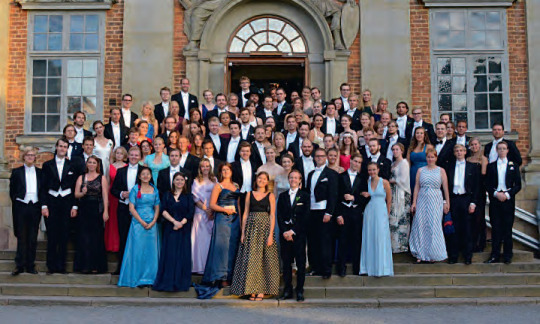
Many aristocrats are very proud of their noble roots and want to pass those on. They have their own networks and clubs; e.g. Ridderskapet och Adelns Ungdomsklubb (RAUK) for 18-35-yo members of introduced noble families. The photo above is from their summer ball in 2016.
The quote by a young (presumably queer) countess interviewed in one of the SvD articles above is quite illustrative. Nobility doesn’t matter when she dates women since they can’t pass it on anyway, and lack of nobility is not a dealbreaker even when she dates men. But it is definitely a selling point if her kids could grow up noble and inherit their dad’s title.
The two noblemen interviewed in the same article are indifferent to the matter of passing it on, and one of them even says he can’t be proud of an ancestry that exploited those under them. However, it’s worth noting that these guys are outliers for talking to the reporter at all. The many land-owning nobles who refused, e.g. the guy who jokingly said “we’re doing well here at the top”, might see it differently. In general, it’s hard to get the elite to talk about their privileges - this was also described in Agnes Hellström’s book Att vara utan att synas about the real boarding schools, which I’ve posted about before.
Anyway, nobility also matters to the rest of the upper classes. The pecking order among those who all have ridiculous amounts of wealth isn’t just based on who has the most money. What matters is how long they’ve been able to retain their wealth, what else they have besides just money, and crucially, how much social capital they’ve amassed as part of the elite.
So-called upstarts who only just made their money lack connections, are ‘out of the loop,’ and don’t know the social codes necessary to fit in. A typical example is that the nouveau riche may be eager to show off their newly improved lot in life, while the established elite strive to act humble about it.
This disdain for new money is demonstrated in YR by August’s look when he introduces Alexander as “son of Ulf Bragé, owner of Bragé Investments” - and of course the way Rickard sticks out like a sore thumb at Parents’ Day. He shows up in a flashy car and expects valet service, unlike the alumni who parked their own expensive but nondescript cars, and he’s also very ungraceful at the table when Wille snubs August.
As seen in the show, information in the form of gossip and rumours, as well as connections in the form of who knows whom, are essential.
Old families haven’t just sat on their money, they’ve invested it in their estates and things like works of art over the centuries. Those are so valuable precisely because they aren’t strictly ‘necessary’ - it’s not real wealth if you have to keep it all at hand. It is considered an enormous shame to have to sell up, as seen with Årnäs in the show.
So maybe it does make sense after all. The nobility have been ‘in the loop’ since way before the bourgeoisie became a thing, and they are such an exclusive lot that the only way to join their ranks is by birth or marriage. That’s the kind of social capital that money can’t buy - directly, that is. Historically, nobles who fell on hard times often found a spouse among the rich bourgeoisie, trading some of their prestige for an economic lifeline.
Speaking of joining their ranks, I want to conclude this with a quick look at two emblems/markers of nobility, so to speak.
Noble names and coats of arms
There are a few different types of noble family names in Sweden, the most prevalent being compound names made up of two words. To distinguish from regular Swedish surnames, noble names often have rather lofty or unusual meanings. For example:
Gyllen - golden, Silfver - silver, Adel/Edel - noble, Ehren - honour/glory, Lejon/Leijon/Löwen - lion, Gripen - griffin, Adler - eagle, Oxen - ox, Lager - laurel, Ceder - cedar...
...stierna - star, crona/krona - crown, svärd - sword, sköld/skiöld - shield, hielm - helm, crantz - wreath, stråle - ray of light, etc.
These can also be combined with more commonly used parts: felt, gren, etc. Some of them may be in a longer, older form: Linden- instead of Lind-, Rosen- instead of Ros-, and so on.
Not all names made up of these parts are noble names! They can also be names that only survive in the female line, or names made up by people who maybe liked the sound of noble names. Furthermore, these are not the only type of noble names out there. A few examples from the long list on Wikipedia, which includes extinct names:
Very simple names: Horn, Grip, Sparre, Creutz, Uggla, etc. These are usually old names with meanings that were easy to paint on a shield.
Non-Swedish names: Walkendorff, Breitholz, Nauckhoff, De la Grange, Duwall, etc. Many of these belong to families who immigrated centuries ago, predominantly from Denmark, present-day Baltics, or present-day Germany.
Names that include a place of origin (town, region or estate): De Geer, von Hofsten, Svinhufvud i Västergötland, Wachtmeister af Johannishus, Hamilton af Hageby, Munck af Fulkila, etc. Or indeed names made to sound like this, such as von Essen.
Names composed of the preposition ‘af’ and the original family name, to signal that they are descended from someone: af Huss, af Sandeberg, etc.
Branches of the same family, distinguished by their estate names: Horn af Åminne, Horn af Kanckas, etc. I guess we can add Horn af Årnäs to the list for YR.
And so on. If you need a noble name for a character, you can look at the list for inspiration - or even just use an existing name. This is what the writers have done in YR with both Felice and August.
Ehrencrona used to be a real name: untitled family number 879, ennobled in 1675 and extinct in 1917. Another branch of the same family was ennobled under the name Ehrenkrona in the same year, as baronial family number 210, and that one is still alive today. Here are their coats of arms - untitled Ehrencrona on the left and baronial Ehrenkrona on the right.
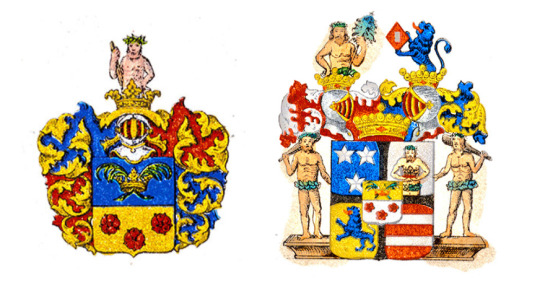
Each family has a coat of arms, and a number in the House of Nobility. The first 100 numbers were drawn at random, the rest are chronological.
Noblemen often bear their coat of arms on a signet ring, like the one we see August wear in the show (the ring can also just be engraved with their monogram, or perhaps a combination of both). In fact, Chrille/Krille wears one too, if you look closely at the Society party scene! Here’s a screenshot of August’s:

The show may not be allowed to use the real heraldic imagery for legal reasons. Most of the branches of the Horn family are extinct, but the main branch, the comital family Horn af Åminne, is still alive. YR can probably get away with inventing a new branch as long as they don’t make the connection to the real family too obvious.
If the coat of arms was accurate, it should include a variation of the typical horn (left) and various things around it, similar to the Horn af Åminne coat of arms (right). I don’t know anything about heraldry, but titled houses often have a whole lot of stuff going on there, symbolising their history and position.
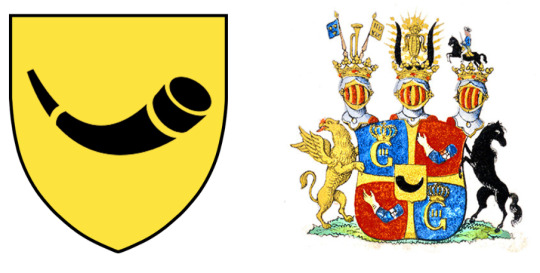
An interesting detail about the signet rings is that in the article mentioned above, one of the men is described as wearing his ring all through their interview, but hiding it when it’s time to take photos. He says “it’s one thing to wear it privately and another thing to show it in a newspaper,” even though he uses it to sign his books sometimes. Which fascinates me - he’s the same guy who said he wasn’t proud of his ancestry and even wrote the somewhat satirical column on nobility linked above, but I guess the signet ring still isn’t just any old trinket to him.
So, that’s it! Thank you for reading all this way! As I said at the start, any additions and corrections are most welcome.
#young royals#young royals meta#swedish nobility#swedish aristocracy#fic writing#fic research#fanfic resource
96 notes
·
View notes